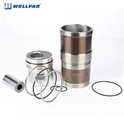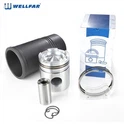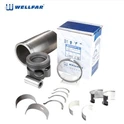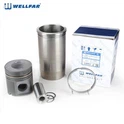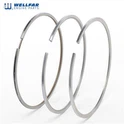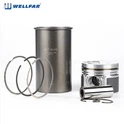1. First piston ring with barrel-shaped surface
In the early days of engine technology, it was commonly believed that the first piston ring would seal even better, the more precisely it matched the geometric rectangular shape. Despite great effort to obtain the greatest dimensional accuracy in manufacturing, the operating performance of the first piston ring did not improve; rather, it got worse.

Practical experience demonstrated that the sealing behavior of the first piston ring improved over time, when the sharp square corners had been worn off. This wear state was then anticipated, first by chamfering, then with a barrel-shaped running surface. With the barrel shape, better hydrodynamic lubricating conditions are achieved, and the axially shorter contact surface at the cylinder surface improves sealing. In addition, the negative effects of cylinder deformations during engine operation can be better compensated. Piston rings of this type, also known as R-ring B, are used as first piston rings.
2.Napier ring with conical running surface
Thanks to a conical running surface, the run-in period of the taper-faced Napier ring is shortened and its oil-stripping effect is amplified. The hook of the taper-faced Napier ring acts as an oil reservoir for scraped oil and prevents it from entering the ring groove. This type of design, also known as the NMring, is used as a second piston ring.

Ring gap configuration
The gap of the piston rings generally has a straight shape.
In two-stroke and opposed-piston engines, an inner or flank recess is made in the ends of the ring, where a safety dowel pin is located in the piston. This secures the piston ring in its location in the piston, which prevents damage to intake and exhaust slits and to the ring ends.

For high blow-by quantities, a taper-faced Napier ring is employed in the middle ring groove with a gap in the groove. The gap in the groove at the joint reduces the passage of combustion gases.



